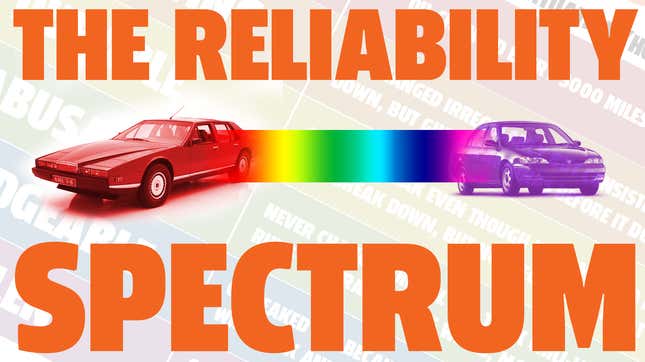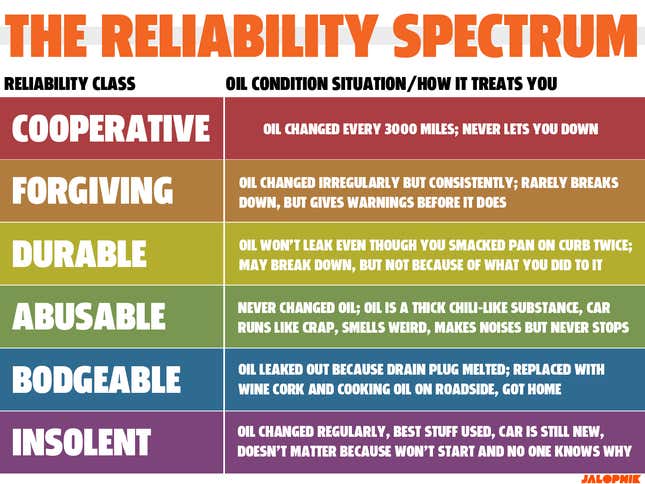
We’ve all heard talk about particular cars’ reliability over and over again, and we all generally understand what’s meant by that. Essentially, we mean will the car break down on you or not, stranding you and leaving you with a lot of expensive repairs or will you never have to worry about it? The problem is that we’re asking way too much from that one word, “reliability.” In reality, reliability is more of a spectrum, with multiple factors in play, so maybe it’s time to expand how we talk about it. And I have some ideas.
I think with reliability, we’re dealing with a sort of spectrum; it’s not so much a binary, because we have to factor in how the car is treated and maintained, and the ever-present unknowability factor: are the problems a car may have even understood, and expected? Can we account for them?
With this in mind, I’ve divided the concept of reliability into six main categories. Getting this down to six was tricky, but I think most cars can find themselves in one of these categories.
Also, a car can, hypothetically, move between categories, to some degree, based on how much the owner is able to put into the car’s care.
This will make more sense when you know what categories I’m talking about, so here, read on:
Cooperative: A car that, if you do what’s required, maintain it carefully and with regularity, the car will never let you down, save perhaps for something really catastrophic and unpreventable. Such a car will have to be free of any major designed-in Achilles’ heels that no amount of preventative maintenance could help.
Ideally, any car should be able to enter this category, but cruel reality often doesn’t let that happen, and it’s demanding: this category only exists with direct and consistent actions from the owner.
Forgiving: A forgiving car is a wonderful thing. These cars can certainly break down, but they seem to have tolerances with a bit more play in them than you might expect. It’s not the end of the world if an oil change is missed, for example, as long as you get to it before too long.
If you lack the considerable discipline to be part of the Cooperative category, you can try your best and hope your car is forgiving. Forgiving doesn’t mean magic, and cars of this category can break down on you, but at least they’re more generous with their buffers.
Durable: A durable car is one that is capable of withstanding a good amount of hard use without things breaking. The opposite of a fragility. This does not mean that the car won’t ever break down, but suggests a certain robustness that can come as much from simplicity of design as well as being actually overbuilt.
It doesn’t mean it won’t strand you for some mechanical reason, it just means it’s hard to break via your use.
Abusable: This category is for cars that get minimal or even zero maintenance or attention. This does not mean the cars run particularly well, and likely these cars may have any number of problems, even some severe, but somehow they just keep running.
The old saying about a some brand’s cars running poorly longer than most cars run at all or your high school friend’s old Corolla that never once had an oil change and with belts that screeched like an orgasming banshee would fit in this category. Think about shitboxes that seem to keep going out of spite, defiantly, forever.
Bodgeable: These are cars that will sometimes break down, likely with some regularity, but when they do, it’s almost always because of some simple, obvious, even stupid failing that’s easy and cheap to fix, and that lends itself well to whatever improvised scrambling you can do to keep it moving.
My Yugo fits in this category, as shown by the two-hose-clamps-and-rock fix.
Insolent: This is likely the worst category of the reliability spectrum. An insolent car will break down on you with gleeful abandon, at unpredictable times and for unpredictable or predictable reasons, regardless of the level of care and maintenance you lavish on the car or how much money you pour into it.
Insolent cars will have baffling and elusive gremlins, maybe electrical, maybe otherwise, but always annoying. They’ll seem great one moment, then strand you somewhere cold, wet, and far away. They tend to be complicated, and often have some amount of baked-in design flaws that may be well-known, but, even worse, maybe not.
My wife’s 2010 VW Tiguan is an insolent car. Enjoyable to drive yet cruel and deceptive underneath, and as I write this I’m about to order a new PCV unit to try and get the stupid thing running right and get that check engine light to shut off.
I think these six variations of reliability cover most of what you’re likely to encounter. To make it easy to remember and understand, here’s a little chart, where we’ll use oil changes as the common metric between the categories:

Does that make sense? I’m open to suggestions, but what I’d love to see is some adoption of language like this, so when you’re looking to buy a car, someone can tell you that it’s a forgiving car, based on their experience, but it was once a bodgable car before they started to at least try taking care of it.
Also, being able to find out if a car is actually insolent or not could save a lot of people’s sanity, marriages, and money.
What am I missing here? Let’s discuss, argue, weep, laugh, and maybe grow a little in the process.